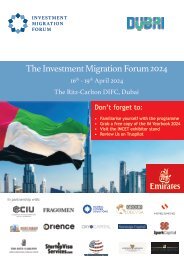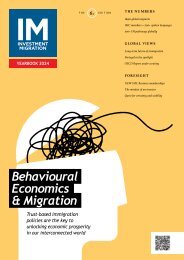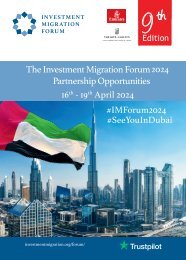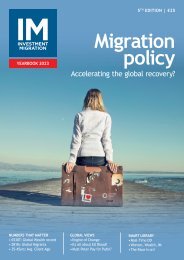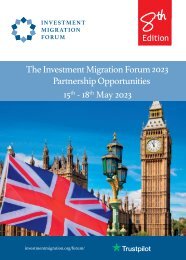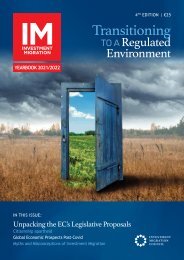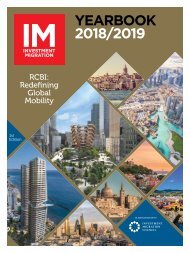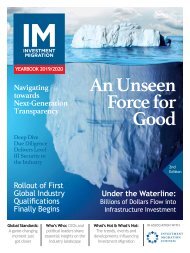IM Yearbook 2020/21
Born from the need for a global, credible, “go-to” publication, the 3rd IM Yearbook offers valuable access to a prime target audience of top industry influencers, decision makers, and the foremost referral network to the world’s most influential Investment Migration programmes: Government officials such as Heads of CIU’s, policy makers, academics, migration agents, law firms, wealth managers, financial advisors, real estate developers, and international firms involved in investment migration.
Born from the need for a global, credible, “go-to” publication, the 3rd IM Yearbook offers valuable access to a prime target audience of top industry influencers, decision makers, and the foremost referral network to the world’s most influential Investment Migration programmes: Government officials such as Heads of CIU’s, policy makers, academics, migration agents, law firms, wealth managers, financial advisors, real estate developers, and international firms involved in investment migration.
You also want an ePaper? Increase the reach of your titles
YUMPU automatically turns print PDFs into web optimized ePapers that Google loves.
In conversation with KIERON SHARP, CEO of FACT Group<br />
CORRUPTION<br />
IS THE REAL RISK<br />
The EU has pointed repeatedly towards<br />
possible negative side-effects of<br />
investment migration, including money<br />
laundering, tax evasion and corruption.<br />
In your opinion, does investment<br />
migration pose a security risk?<br />
I think it’s worth to take a step back at first and<br />
consider that people have always invested in<br />
other countries as a means to be able to live<br />
there or to improve their freedom of lifestyle.<br />
The only thing that golden citizenship and<br />
golden visa programmes have done is to<br />
formalise the process. Any form of migration<br />
presents a potential security threat and,<br />
therefore, security must be a major factor<br />
for investment migration programmes. No<br />
country wants convicted criminals amongst<br />
their new residents or citizens and increased<br />
measures are being put in place to ensure that<br />
the people who are going to become citizens<br />
or residents are ‘fit and proper’ individuals.<br />
The programmes that we at FACT work with<br />
all have very high standards and processes in<br />
this regard, which are reviewed continuously.<br />
Cyprus has stopped its citizenship-byinvestment<br />
(CBI) programme after a<br />
report by Al Jazeera alleged high-ranking<br />
politicians were willing to issue passports<br />
to convicted criminals. What’s your<br />
reaction to this recent development?<br />
All efforts to screen applicants fall apart if there<br />
are corrupt individuals who are in a position<br />
to influence decision-making so that people<br />
who are clearly unacceptable can become<br />
citizens. That’s why it is important to have<br />
checks and balances built into the programme,<br />
but it’s even more vital to ensure that there<br />
are checks and balances on the influence that<br />
politicians and senior government officials<br />
have on a programme. You would like to think<br />
that governments are always trying to ensure<br />
that their systems prevent undue influence,<br />
but the problem with corruption is that it’s a<br />
secret offence. You can put everything in place<br />
– all the laws, regulations and safeguards – but<br />
it can still happen. A corrupt act is usually<br />
between two people – so it’s very difficult to<br />
spot. All forms of economic crime usually<br />
involve an insider because large scale fraud<br />
rarely happens completely from the outside.<br />
The moment there are corrupt individuals<br />
involved, it presents an opportunity to<br />
destabilise an entire system or government.<br />
What about the money laundering risk?<br />
Money laundering is often thrown into the<br />
discussion because it is a catch-all term for any<br />
economic crime that doesn’t fit in a specific<br />
category. It is a simple fact that people who<br />
are involved in any criminal activity will have<br />
to clean their money at some point. In some<br />
countries it is completely unnecessary because<br />
it doesn’t seem to matter that they got the money<br />
from an illicit source, but in the majority of<br />
countries it does, so they need to find a way to<br />
make that money clean. Money laundering is<br />
actually a big part of a criminal lifestyle. There<br />
are not many people who commit a crime<br />
once and then need to launder money just<br />
once. So, using a CBI programme as a means<br />
of laundering money is not a very effective<br />
way. The main reason is that you don’t get<br />
your money back. Laundering money means<br />
you are taking dirty money and you get clean<br />
money back. When it comes to investment<br />
migration, that’s not the case. Additionally,<br />
you can only do it once as you can’t keep on<br />
investing in different programmes. It doesn’t<br />
really help when you have got criminal profits<br />
coming from your criminal enterprise. It’s not<br />
the most obvious thing that people would<br />
want to use a CBI programme for. The same<br />
can be said about the tax evasion argument.<br />
CBI programmes require one-off payments,<br />
so, you are only tax evading once. It may be<br />
that you become a citizen of a country with a<br />
more attractive tax regime, but that’s not tax<br />
evasion, not even tax avoidance necessarily.<br />
Is there anything that could be brought<br />
in from a European security perspective,<br />
such as another layer of checks and<br />
balances, that would give comfort to<br />
member states and EU institutions that the<br />
new citizens are fit and proper persons?<br />
I recall that some 25 years ago there were<br />
discussions on a variety of security issues,<br />
such as co-operation between national police<br />
forces and the harmonisation of criminal<br />
laws. Very little of it actually happened, and<br />
I think one reason for it is that in areas such<br />
as security, policing and criminal justice,<br />
countries still feel the need to protect themselves<br />
as individual countries first and foremost,<br />
with the intention of maintaining their own<br />
sovereignty in such key areas. This is the<br />
argument that EU-based CBI schemes make.<br />
How do you think the investment<br />
migration industry’s relationship<br />
with the EU will develop?<br />
The sector has definitely recognised that it has<br />
come under scrutiny, but I think nobody is<br />
scared of that. What the industry wants to do is<br />
to make sure that it can withstand the scrutiny.<br />
Based on my experience, I can say that the<br />
programmes we work with are improving their<br />
processes, standards and checks all the time.<br />
Kieron Sharp, former<br />
City of London Police<br />
detective and head of<br />
the economic crime<br />
team at Interpol,<br />
talks about the threat<br />
to EU security that<br />
investment migration<br />
programmes<br />
bring about.<br />
Kieron Sharp has<br />
BIO been in charge at<br />
FACT since 2006,<br />
overseeing the content<br />
protection and antipiracy<br />
response to huge<br />
technological changes in<br />
the audio-visual landscape.<br />
His 30-year career with<br />
the Metropolitan Police<br />
and City of London Police<br />
included a four-year<br />
secondment to Interpol as<br />
Head of the Economic Crime<br />
Department and culminated<br />
in the position of Detective<br />
Chief Superintendent in<br />
charge of Specialist Crime<br />
Operations in the City of<br />
London. Kieron is also a<br />
graduate of the Federal<br />
Bureau of Investigation<br />
(FBI) National Academy<br />
in Quantico, Virginia.<br />
Investment Migration <strong>Yearbook</strong> 2O2O/2O<strong>21</strong> 35




